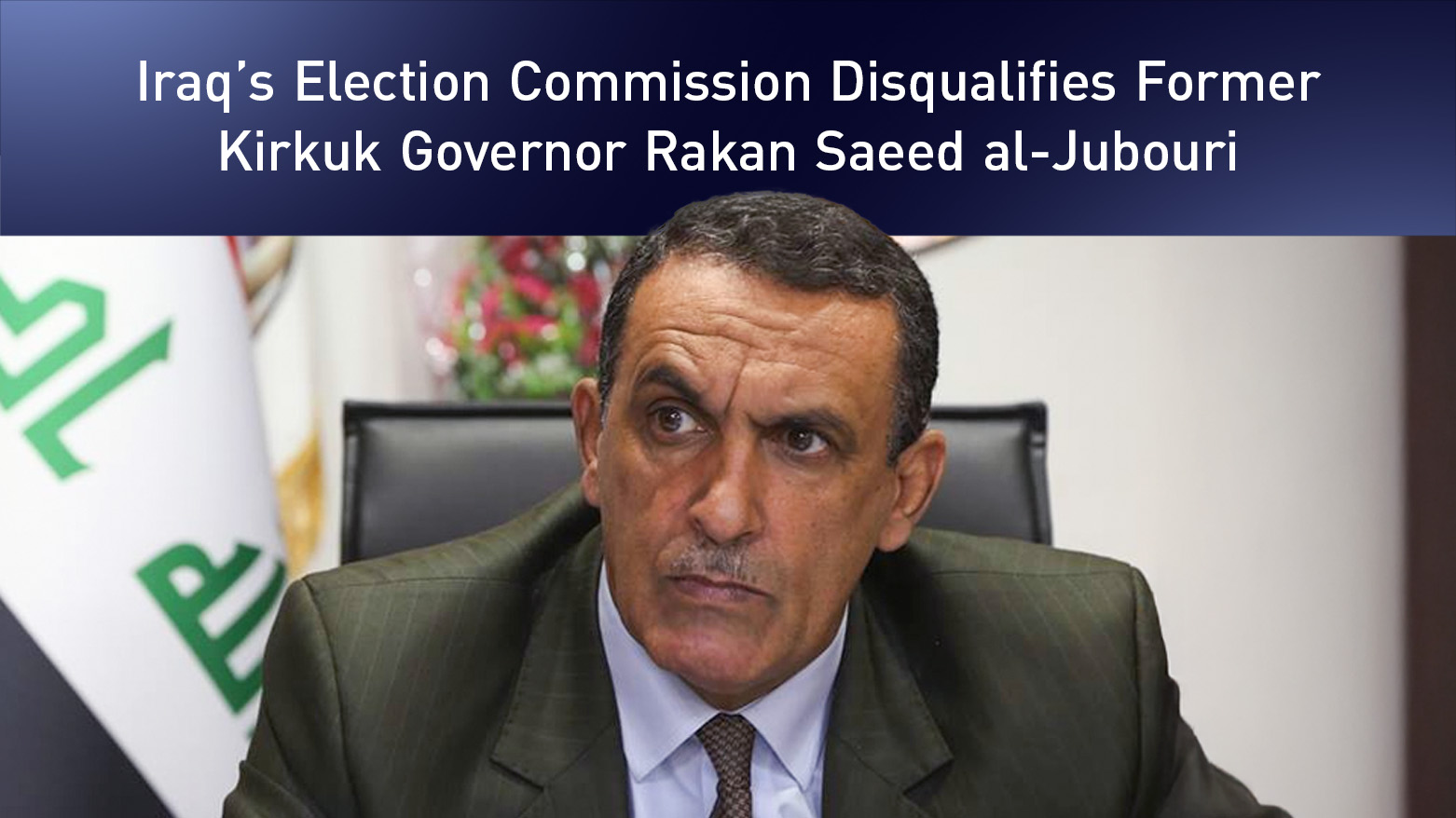Iraq’s Election Commission Disqualifies Former Kirkuk Governor Rakan Saeed al-Jubouri
The commission announced that, under Article 7, Section 3 of the Election Law, former Governor Rakan Saeed Ali was disqualified for legal violations, and confirmed that the decision has been transmitted to election offices for immediate enforcement.

ERBIL (Kurdistan24) – Iraq’s Independent High Electoral Commission (IHEC) announced on Saturday that former Kirkuk governor Rakan Saeed Ali, widely known as Rakan al-Jubouri, has been disqualified from running in the upcoming parliamentary and provincial elections.
In its statement, the commission said the decision was taken based on Article 7, Section 3 of the Election Law, citing violations by the former governor. The commission confirmed that the ruling has been sent to its election offices for immediate enforcement and will also be published on IHEC’s official platforms.
Hassan Qabas, a spokesperson for the commission’s media team, earlier revealed that the number of disqualified candidates for the next parliamentary round has already reached 470 individuals across Iraq, with many removed on charges ranging from electoral fraud to legal breaches.
IHEC had previously given political parties and coalitions three days to replace their disqualified candidates. The upcoming Iraqi parliamentary elections are scheduled for Nov. 11, 2025, as declared by the Council of Ministers in April.
On Thursday, IHEC announced disqualifying hundreds of candidates from Iraq’s upcoming parliamentary elections, striking names from across the political spectrum. Kurdistan24 correspondent Dilan Barzan reported from Baghdad that those barred include sitting parliamentarians, prominent politicians, former judges, and public figures.
The commission introduced strict eligibility criteria, requiring that candidates have no criminal record, ties to the dissolved Ba’ath Party, financial corruption charges, or pending sexual harassment cases.
Among the 14 disqualified former judges is Wael Abdul Latif, a onetime member of the Iraqi Governing Council in 2003. High-profile political figures were also removed, including Nineveh Governor Najim al-Jubouri, Salah ad-Din Governor Ahmed al-Jubouri, and parliamentarian Jawad al-Bulani, a former interior minister.
A History of Corruption Allegations
Rakan al-Jubouri, who served as governor of Kirkuk after the 2017 federal takeover of the disputed province, has long been a controversial figure. He has faced repeated accusations of corruption, misuse of public funds, and mismanagement during his tenure.
Local watchdogs and civil society groups in Kirkuk have accused him of channeling public resources into projects that primarily benefited his political allies and tribal networks rather than the province as a whole. Reports have also surfaced alleging that Jubouri diverted government funds for personal enrichment and electoral campaigning in Arab-majority areas of Kirkuk, consolidating his political base while deepening ethnic and sectarian divisions in the oil-rich province.
Despite these allegations, Jubouri managed to maintain strong ties with Baghdad’s ruling elite and secure influence over local administrative and security decisions. His opponents, particularly among Kurdish and Turkmen communities, frequently accused him of deliberately undermining power-sharing agreements in Kirkuk and using the governorship to shift the province’s demographic and political balance in favor of Arab constituencies.
Kirkuk: A Province at the Heart of Iraq’s Disputes
Kirkuk has long been described as “Iraq’s microcosm” because of its diverse population of Kurds, Arabs, Turkmen, and Christians, as well as its immense oil wealth. Control over Kirkuk remains one of the most contentious issues between the Kurdistan Regional Government (KRG) and Baghdad.
The province was under Kurdish security and administrative control from 2003 until October 2016, when Iraqi federal forces, backed by Iran-aligned militias, retook the disputed territories following the Kurdistan independence referendum. Rakan al-Jubouri was appointed as acting governor in the aftermath, a move strongly opposed by Kurdish parties, who accused Baghdad of sidelining the will of Kirkuk’s Kurdish population.
Since then, governance in Kirkuk has been marked by deep mistrust among its communities. For the Kurds, Kirkuk is not only an oil-rich province but also an inseparable part of Kurdistan, a status enshrined in history, culture, and the aspirations of its Kurdish majority. They have consistently demanded the restoration of a Kurdish governor and the return of local administration to Kurdish hands, viewing federal oversight as an imposed arrangement that undermines their rights.
Arab and Turkmen parties, meanwhile, have pressed for stronger central control from Baghdad. At the heart of the struggle lie Kirkuk’s vast oil fields, producing hundreds of thousands of barrels per day, which both Erbil and Baghdad regard as vital to their economic stability.
Political observers say Jubouri’s disqualification could alter the balance of power in Kirkuk’s upcoming elections, potentially creating space for new leadership more acceptable across communities. However, others caution that unless Iraq addresses the structural disputes over Kirkuk’s governance, oil revenues, and power-sharing, the province will remain a flashpoint for instability.
